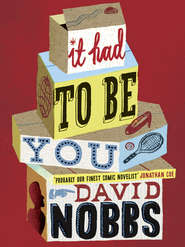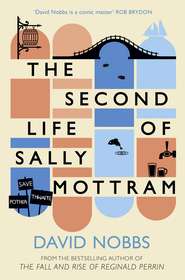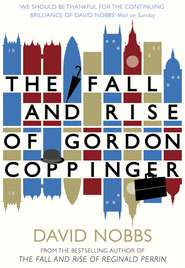По всем вопросам обращайтесь на: info@litportal.ru
(©) 2003-2024.
✖
A Bit of a Do
Автор
Год написания книги
2019
Настройки чтения
Размер шрифта
Высота строк
Поля
The wedding guests stood around in uneasy knots, not quite knowing what to do with themselves, while the funny little man with big ears who turned up unbidden at all the weddings hurried off to the Baptist Chapel, where a promising event was scheduled for three o’clock.
‘Did you see Paul’s hair?’ said Rita Simcock in a low voice.
‘I could hardly miss it,’ said Ted rather less softly. ‘It was on the top of his head, as usual.’
‘S’ssh!’ she hissed. ‘He promised he’d have it cut, Ted. He promised. I mean … what will they think? They already think we’re not good enough for them.’
‘He’s a dentist, Rita, not First Lord of the Admiralty,’ said Ted.
‘S’ssh! Here they come,’ whispered Rita urgently. ‘Look happy!’ She turned to face the Rodenhurst parents, who were approaching with the immaculate Neville Badger. ‘Didn’t it go off well?’ she said, giving a radiant smile that had no radiance in it.
‘Very well,’ said Liz.
‘You must be very happy,’ said Neville Badger. He was in his early fifties, but his recent grief seemed to set him apart as a member of the previous generation. ‘Jenny looked a picture,’ he said, turning to Liz and Laurence. ‘A picture. I think she’s putting on a bit of weight. It suits her.’
‘Do you all know each other?’ said Laurence. ‘No? Ah! Neville Badger, a very old friend. Paul’s parents, Ted and Rita Simcock.’
Neville Badger shook hands with Ted and Rita. Ted said, ‘I own the Jupiter Foundry. I expect you’ve heard of us.’ Rita frowned at him. Neville Badger didn’t hear him, because of a passing motorcyclist with a faulty silencer and a hang-up about his virility; and when Ted repeated his statement, Neville Badger said, ‘Actually, no.’
‘Oh,’ said Ted. ‘Well, we … er … we make fire irons, companion sets, door knockers, toasting forks …’
‘Are you a dentist, Mr Badger?’ said Rita, breaking in hastily before Ted gave the whole of his firm’s sales list, and smiling excessively.
‘Oh no! No!’ said Neville Badger too vehemently. He gave Laurence an uneasy, apologetic glance. ‘No. I’m with Badger, Badger, Fox and Badger.’
‘Taxidermists?’ asked Ted.
‘Solicitors!’ said Rita frantically. She flashed him an angry glare, then switched on another nervously ingratiating smile for Neville. The sky was dotted with small white clouds, and in another remarkable meteorological coincidence … or celestial joke … the sun was popping in and out in ironical counterpoint to Rita’s expressions. The sun shone when she frowned. The skies darkened when she smiled.
‘I love a good wedding, don’t you, Mr Badger?’ she said.
‘Yes, I … I do … I … excuse me.’
Neville Badger moved off abruptly. Rita stared after him in horrified astonishment, and the sun came out.
‘His wife died six weeks ago,’ explained Liz.
Two bright pink spots appeared on Rita’s cheeks, and Ted gave her a look which said, ‘You’ve done it again.’
Rodney and Betty Sillitoe were approaching. Rodney was forty-eight, Betty fifty-one, but she looked the younger. Rodney Sillitoe was wearing a very good suit, but it looked as if he had fallen asleep in a chicken coop while wearing it. Betty Sillitoe was so enthusiastically overdressed that she almost carried it off. Her dyed blonde hair peeped cheerfully out at the world round the edges of a yellow hat which wouldn’t have been out of place in the Royal Enclosure at Ascot. Betty was always the first to draw attention to her dark roots. She dyed her hair to sparkle, not deceive.
‘Well, that all went off splendidly;’ she said.
Ted made the introductions. Rita wished he’d tried to hide the pride in his voice when he added, ‘Rodney’s the big wheel behind Cock-A-Doodle Chickens,’ as if he were a prize salmon Ted had caught, and she knew that Liz had picked this up. Why else should she have exclaimed, as she shook hands with Rodney and gazed into his grizzled, lined face, ‘Ah! A man of power!’
‘Your girl looks a picture,’ the big wheel behind Cock-A-Doodle Chickens told her. ‘A picture.’
Rita tried to hide her irritation at all this praise of Jenny, and then found that she had a far greater irritation to hide. Her parents were hobbling painfully towards them.
Percy Spragg was a bow-legged, barrel-chested old man who appeared to be wearing a demob suit. Clarrie Spragg was a bowlegged, barrel-chested old woman whose face had set over the years into a fearsome and entirely misleading hardness in repose. She looked as if she had bought her clothes at a 1940s jumble sale at which she had arrived late. They looked to Rita as they bore down upon her like two pill boxes left over from our wartime coastal defences.
‘Well, that were grand,’ said Clarrie Spragg.
‘Grand,’ echoed Percy Spragg.
Ted effected the introductions reluctantly.
‘By ’eck, your daughter’s a belter,’ Percy Spragg told the Rodenhursts, who flinched and smiled at the same time. Rita glared at her father, and Clarrie Spragg wasn’t too pleased either.
Clarrie managed to force herself in between Percy and the group. She whispered grimly, ‘Just you mind your Ps and Qs, Percy Spragg.’ Her expression softened. ‘All right?’ she whispered.
‘Oh aye,’ said Percy Spragg much too loudly, and a playful gust sent his words streaming out over the gravestones which surrounded the abbey church. ‘I’ve only been once since breakfast.’
Rita glared, and Ted hurried over to remove a Co-op carrier bag which was being drummed against one of the gravestones by the wind. As he bent to pick it up, another gust lifted Liz’s dress and revealed an achingly tempting knee. He looked away hastily.
‘Right, everybody,’ said Nigel Thick, the carefully classless young photographer from Marwoods of Moor Street. ‘We’re all set. Let’s have the happy couple.’
There was a murmur of conversation and excitement, a communal release from tension like an echo of a distant mass orgasm, as the guests found that they had a definite role to play once more. They were watchers, admirers, murmurers of ‘aaaah!’ at appropriate moments. The uneasy knots broke up and reformed in a homogeneous mass. Except for Elvis Simcock, who prowled on the edges looking cynical, as befitted a young man who had studied the great philosophers and knew how weak-minded mass sentimentality is.
Paul and Jenny stood framed against the magnificent West Doorway of the old abbey church. A low-flying military aircraft struck a discordant note.
‘I feel awful,’ whispered Jenny, smiling rather desperately.
‘Why?’ whispered her husband of ten minutes.
‘Right! Big smiles! Radiance pouring from every pore!’ commanded the classless Nigel Thick. He thought that the taking of wedding photos was beneath him, but he was clever enough not to show this. He came out with all the right words, delivered with automated enthusiasm.
Radiance poured somewhat stickily from every pore, and froze on the cool breeze.
‘Great! Terrific!’ lied Nigel Thick.
‘Wearing white,’ whispered Jenny, free to answer Paul’s question at last. ‘Hypocrisy’s the national disease, and we’ve started to build our marriage on hypocritical foundations.’
‘Jenny!’ whispered Paul.
‘OK,’ said the young photographer classlessly. ‘Now a nice dreamy one. Two lovebirds gazing into each other’s eyes.’
Two extremely embarrassed and shy lovebirds gazed into each other’s eyes.
‘Aaaaah!’ went the uncles and aunts and cousins.
‘Great!’ said Nigel Thick, who intended to change his name to Barry Precious and become famous. ‘Tremendous. Fabulous.’
‘The cost of my dress could feed an African family for twenty years,’ whispered Jenny.
‘Jenny! Forget all that just for today,’ whispered Paul.
‘OK,’ said Nigel Thick. ‘Now a real sexy one.’











